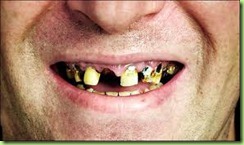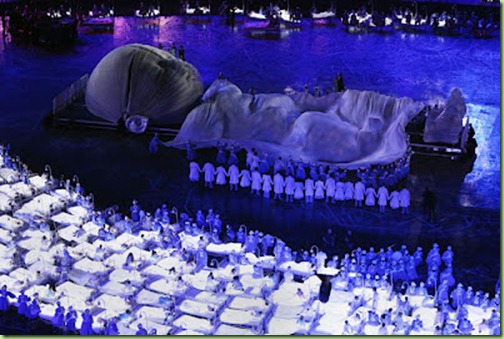Heptathlete Eliska Klucinova Stripping At London’s Olympic Stadium
August 4th, 2012
You think Czech Republic’s Eliska Klucinova is scared to rip off her track shorts while international TV cameras are shooting video of her and opponents in the heptathlete competition in London? Doesn’t look like she cares. Just rips off those booty shorts like a pro. Still think these minor Olympic sports are worthless? You guys need to find yourself a good international TV feed and wait for NSFW moments. Or keep watching Costas. Your call. JUMP!
In case you care, Klucinova is currently 23rd in the heptathlon so don’t worry about her sneaking out a medal for the Czech Republic.
________________________________________________
Sex Doesn't Always Sell: Why Female Olympians Fail in Advertisements
Guys want to be like Mike; girls want Mia to be like them.But a comparison of Franklins' earning potential to that of Michael Phelps underscores the pervasive underrepresentation of female athletes in advertising. Not a single female athlete appeared on the 2011 Sports Illustrated list of the 50 highest-earning U.S. athletes, a fact that's highlighted in a forthcoming study in the Journal of Brand Management. A Turner report found that, of the sports figures featured as endorsers on 11.9 percent of television commercials, only 3 percent are women.
For an endorser to be successful - according to a well-established branding model -- he or she must follow the pillars of "Familiarity, Likability, and Similarity." Researchers John Antil and Matthew Robinson, who conducted a series of focus groups on the topic, found that female athletes are lacking in all three.
The familiarity part is obvious: the Olympics, for the two short weeks when they take over the news cycle, are an exception to the otherwise general U.S. disinterest in female athletics. But Antil and Robinson suggest that it's also the way female athletes are portrayed in the endorsements they do get -- with the focus on their youthful, toned bodies -- that alienates them from female consumers, contributing to their general lack of marketability.
The study makes the troubling accusation that female consumers are jealous of spokeswomen who are made out to be paragons of strength and attractiveness, suggesting that's one reason why ads focused on female athletes' physicality are unsuccessful. "A female looking at an attractive female, as opposed to saying 'I want to be like that,' actually has a negative reaction," said Robinson.
Originally, the authors wanted to call the study "Guys Want to Be Like Mike, Girls Want Mia to Be Like Them." In branding strategy, they stress, there needs to be a transfer of meaning from the endorser to the product to the consumer. When there's a disconnect in this process, the endorsement doesn't work. Robinson adds that middle-aged women have trouble connecting with younger female athletes, while teen girls react to images like Danica Patrick's GoDaddy commercials by saying, "That's like seeing my mom in a bikini."
An underlying issue may simply be that Olympic athletes are such outliers from the norm. "When you promote sexuality and beauty, the average woman has a hard time relating to that," said Antil. He insists that it's not disempowering to tone down the focus on endorsers' athletic ability, and that the same thing occurs with male endorsers. Once athletes have established a modicum of celebrity through their performance, advertisers would do well to attempt to find something about them that is more universally relatable. Ideally something relevant to the product they're attempting to sell.
1984 gold medal gymnast Mary Lou Retton, said Robinson, sets a positive example for how female athletes might go about retaining their familiarity and connecting with a consumer base. Marketers focus on the way Retton balances being a wife and mother with her athletic endeavors and her celebrity status. The ad campaigns therefore reach similar women, a demographic with significant purchasing power.
Retton's staying power is an anomaly, and one that is crucial for Olympic athletes who hope to make money from endorsement deals. The "Fab Five" of this year's U.S. Women's Gymnastics team have the potential to remain popular beyond this summer, said Antil, as much because of their personalities as because of their performance. As they attempt to maximize their marketability in the long term, advertisers will probably do well to humanize our Olympic heroines rather than flaunt their superhuman physiques.
________________________________________________
Butt for the empty seats, everything’s going well at the games
You know those comments that Romney made about Olympic security that upset everyone in London?
"There are a few things that were disconcerting -- the stories about the private security firm not having enough people, the supposed strike of the immigration and customs officials -- that obviously is not something which is encouraging,"Geeze, at his age Mitt should have mastered the “I can criticize my sister, butt don’t YOU even THINK about criticizing my sister!” rule.
In the first place, he was only acknowledging the well publicized fact that:
Security arrangements were thrown into chaos weeks before the opening ceremony when private security contractor G4S acknowledged it would not be able to provide all the guards it had promised. Thousands of soldiers, sailors and air force personnel — some just back from Afghanistan — had to be drafted in to plug the Olympic security gaps.And then of course there was that little security snafu involving the “lady in red” who just walked right in and joined the the Indian delegation in blue and gold during the opening ceremonies.
What is it about Indian events that attracts gatecrashers in red anyway?
Unfortunately that wasn’t the only Olympic gaffe so far. There was also the story about the keys to Wembley Stadium going missing. Don’t worry, police say they were just misplaced, not stolen. I’m not sure how they know that though, since they had to change all the locks because the originals still haven’t been located. Butt hey! What did you expect from the Brits? If you wanted precision you should’ve gone with the Germans; punctuality, the Swiss. The British are better known for…their health care:

And socialized dental care:

The National Health Service, lionized during the Olympic Opening Ceremonies, is best known not so much for its efficiency, butt its creepiness:

David Cameron, feeling like a spurned relative of some sort, responded to Mitt’s perceived criticism by blasting back:
“We are holding an Olympic Games in one of the busiest most active bustling cities anywhere in the world. Of course it's easier if you hold an Olympic Games in the middle of nowhere.”So you would think that holding an Olympic Games in one of the busiest most active bustling cities anywhere in the world, they wouldn’t have any trouble whatsoever getting butts in the seats, would you?




At the risk of sounding critical, this looks like possibly poor crowd management
 The military was called in to put butts in the seats. Some of them look interested. Others are watching Netflix on their iPhones.
The military was called in to put butts in the seats. Some of them look interested. Others are watching Netflix on their iPhones.Butt here’s something funny: I was actually at Mitt’s Olympics in Salt Lake back in 2002!
Even the outdoor seats – and it was freezing cold!
I don’t know what to make of this: empty seats in air-conditioned facilities in the middle of one of the world’s most bustling cities; no empty seats in mostly outdoor arenas in the middle of winter in the middle of nowhere.
How do you explain that? Maybe different management techniques? Better management?
Could it be that the bully vulture vampire capitalist wimp who somehow managed to run the Olympics while simultaneously running Bain Capital is just a better manager than the Brits hired for their games? Or maybe they chose the head of their Olympic committee by lottery? Or popularity contest? Or maybe he wrote an autobiography that talked about how he’d always dreamed of running the Olympics?
Oh - and need I remind you that 9-11 occurred just 4 months before Mitt’s games? Until then it was never necessary to search and screen everyone with metal detectors before allowing them to enter any of the Olympic venues? That kind of last minute adjustment sure could have caused a lot of problems for the SLC Olympics. Still: everything went like clockwork. Just like in Switzerland! And no empty seats. Like I said: go figure.







![motus_snoboard-2_copy[3] motus_snoboard-2_copy[3]](https://blogger.googleusercontent.com/img/b/R29vZ2xl/AVvXsEjBXsXxw-9pf1DcDfXdZJEhaFs6bLBYj0fZPXgt5su3AhnPCdH7FZ-z42HTMkP8RRWIvRvFPp9QJ_Aw29XTLNrtP824bFWyIAJ_QJMnaZJ_Zm3IeTpWIYHpJBXb35jTnlrxAxieFOahnY0J/?imgmax=800)





